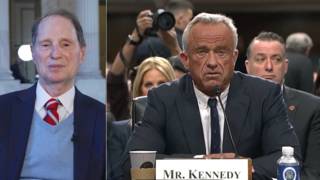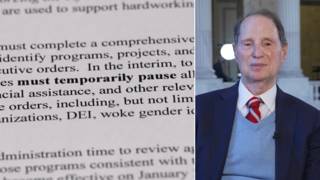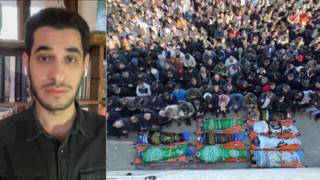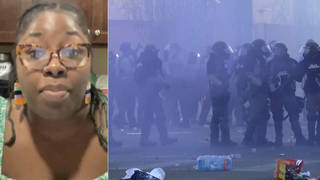
Related
Guests
- Lena K. Gardnerco-founder and organizer of the Minneapolis chapter of Black Lives Matter.
Federal prosecutors in Minnesota announced Wednesday that no charges will be filed against the two police officers involved in the shooting death last fall of Jamar Clark, an unarmed 24-year-old African American. Clark was shot in the head after a scuffle with officers who responded to a report of an assault. However, multiple witnesses say Clark was shot while handcuffed. Clark’s death sparked a series of protests in Minneapolis, including a weeks-long occupation outside the 4th Police Precinct and a protest during which white supremacists opened fire on a group of Black Lives Matter activists. We speak with Lena K. Gardner, co-founder and organizer of the Minneapolis chapter of Black Lives Matter. “There’s a very specific interpretation of events that happened in order to protect the officers,” Gardner says. “I believe that the system is set up to protect officers, to ensure that their version of events is given more credibility.”
Transcript
NERMEEN SHAIKH: We turn now to Minneapolis, Minnesota, where federal prosecutors announced Wednesday that no charges will be filed against two police officers involved in the shooting death last fall of Jamar Clark, an unarmed 24-year-old African American. Clark was shot in the head after a scuffle with officers who responded to a report of an assault. But multiple witnesses say Clark was shot while handcuffed. This is U.S. Attorney Andrew Luger speaking at a news conference Wednesday.
ANDREW LUGER: There are no winners here, and there’s no victory for anyone. A young man has died, and it is a tragedy. As a father with children the same age as Jamar Clark, my heart goes out to his family, and I told them so before this event. For the family, for the community, for the police department and for the cause of justice, experienced, highly trained agents and prosecutors worked for months to find and examine facts to determine if there was a criminal civil rights case that can be brought here. We have all concluded that no such case can be made.
AMY GOODMAN: In March, Hennepin County Attorney Mike Freeman also decided not to bring charges against the officers, Mark Ringgenberg and Dustin Schwarze, both white. In announcing the decision, Freeman rejected multiple eyewitness accounts that Clark was handcuffed, and claimed Clark at one point had his hand on one officer’s gun. Jamar’s cousin Cameron Clark spoke out after the decision.
CAMERON CLARK: There’s blood on Mike Freeman’s hands. I can’t control what the city—we’ve been [inaudible] for four months. We’re tired of this. And y’all supposed to be protecting and serving. Y’all are not protecting. Y’all is the biggest gang. Y’all are killing us. And y’all get to get away with it.
AMY GOODMAN: Jamar Clark’s death sparked a series of protests in Minneapolis, including a weeks-long occupation outside the 4th Police Precinct and a protest during which white supremacists opened fire on a group of Black Lives Matter activists.
For more, we’re going to Minneapolis to be joined by Lena K. Gardner, co-founder and organizer of the Minneapolis chapter of Black Lives Matter.
Welcome to Democracy Now!, Lena. Start off by responding to the decision not to charge the officers, and then tell us who Jamar Clark was.
LENA K. GARDNER: Well, first, thank you so much for having me on the show. I think, you know, first and foremost, our hearts go out to Jamar’s family. This is devastating news. It’s really clear that there is no justice for black people in this country when it comes to the criminal justice system. Time and time again, we are denied justice, and this is another example of that.
This announcement comes at a time when I believe the movement is under attack. The Minneapolis president of the police union came out calling us terrorists in the wake of this decision. We see activists in California facing felony charges for practicing their constitutional right to protest. And, you know, we really want folks to know that we are going to continue to fight, we are going to continue to build, and we want people to join with us in fighting to save black lives.
You know, Jamar was a beloved person. He wasn’t perfect, but he was loved by his family, his friends and his community. And it’s really clear that we continue to hold his life and his name in our hearts as we continue to fight.
NERMEEN SHAIKH: Well, could you talk about how you pressured Hennepin County Attorney Mike Freeman to release the video of Jamar Clark’s killing?
LENA K. GARDNER: Absolutely. You know, there is a precedent in the criminal justice system to take fatal police shootings to a grand jury system to make the decision whether to indict officers or not. We know that this doesn’t work, and we know that it continually fails to bring officers into accountability, and it fails to deliver justice. So, we, along with several other groups and black-led organizations here in Minneapolis, including the Twin Cities Coalition for Justice 4 Jamar, the NAACP and Minnesota Neighborhoods Organizing for Change, you know, we held actions. Folks had meetings with Hennepin County Attorney Mike Freeman, and we really spoke to him about our concerns around transparency in the process and accountability.
When a case goes to a grand jury, it’s done in secret. The evidence isn’t released to the public. And we really wanted to know what’s on those tapes. We believe that transparency is one of the key ways that we can begin to hold police officers accountable, and so we wanted to see that footage from the day Jamar was taken from us. We were saying, “We want to see the tapes.” And so, we just really drove that message home. There were actions every week.
And, you know, Hennepin County Attorney Mike Freeman decided to listen to that particular aspect of what we were asking, to not send the case to the grand jury. He also committed to, as long as he is in office, to not send any more fatal police shootings to a grand jury. However, there’s been no substantive policy change that is permanent, as far as we can see. So, as soon as another Hennepin County attorney is elected into office, you know, we could see these cases going back to grand juries and it all being done in secret again. So, we still have work to do. We still have reforms and policies that we want to see change, because we’re trying to save black lives.
AMY GOODMAN: I want to turn to more comments made by the U.S. attorney, Andrew Luger, at the news conference on Wednesday.
ANDREW LUGER: Given the lack of bruising, the lack of Mr. Clark’s DNA on the handcuffs, and the deeply conflicted testimony about whether he was handcuffed, we determined that we could not pursue this case based on a prosecution theory that Mr. Clark was handcuffed at the time that he was shot. And, in fact, we reached the conclusion, based on all of the evidence that we reviewed, that the evidence suggested that Mr. Clark was not, in fact, handcuffed when he was shot.
Our second area of focus was what happened when Mr. Clark and the two officers were on the ground. We wanted to know whether the available evidence would support a finding beyond a reasonable doubt that the officers acted in a manner that was objectively unreasonable, even if Mr. Clark was not handcuffed.
AMY GOODMAN: Lena K. Gardner, can you respond to the U.S. attorney, Andrew Luger?
LENA K. GARDNER: Yes. The first thing I want to say is that I believe the people. I believe community. I believe when people tell me what they saw. I believe that over the accounts of police officers in any situation where they have killed a black person. You can see how even in his language talking about this case, he says Jamar Clark died. Jamar Clark didn’t die. He was murdered. He was killed by the police. And so, I believe that when people say—and we have countless witnesses that say that they saw Jamar Clark handcuffed, and they shot him while he was handcuffed.
I also know that during the time of—in the weeks after his killing, you had the president of the police union, Bob Kroll, saying—intimidating witnesses, publicly, in the media, saying that people should be prosecuted if they came forward to speak. So, when you hear about conflicting details, I always wonder: Were people scared? And I think they were. When you have people in power, police officers, who have the power, live in their communities, to terrorize them and harass them for speaking up to what they saw, that’s a big problem. That’s the kind of situation we’re dealing with. And we need to believe community. We need to believe what people tell us.
The second thing I really think is important to note is that there’s a very specific interpretation of events that happened in order to protect the officers. And I believe that the system is set up to protect officers, to ensure that their version of events is given more credibility. There have been several articles that have come out since the findings, since Hennepin County Attorney Mike Freeman made them public, that showed—that call into question the police version of events. For instance, the fact that we know that it was a—you know, he was taken—Jamar Clark was taken down by the police officer in a hold that was violent, in a hold that was not—is not approved by Minneapolis Police Department policy. And somehow, things like that are never mentioned, you know, when we’re hearing from Hennepin County Attorney Mike Freeman or Andy Luger. And this is a problem. And I think it points to—I think it points to why the system continually fails black people and does not bring about justice.
AMY GOODMAN: Finally, Lena—we have 30 seconds—where do you go from here, after the second investigation? The officers have not been indicted.
LENA K. GARDNER: Right. You know, from here, we are going to continue to build. We’re going to continue to fight. We will not forget Jamar. We will not forget his family. We’re going to support them in their efforts. There is talk of a potential civil suit, you know, pursuing a civil suit. And we’re going to continue to support getting justice, holding these officers accountable in some way, and continue to fight for black lives and to save black lives. We need everyone’s help in that. And I hope that folks will join their local chapters all across the country. I hope that people will stand up and fight with us, because we are the ones saving black lives. We are the ones fighting for black lives. And contrary to what people like the, you know, racist president of the Minneapolis police union says, we are not terrorists. We are protesters, and we are fighting to save black lives.
AMY GOODMAN: Lena K. Gardner, we want to thank you for being with us, co-founder and organizer of the Minneapolis chapter of Black Lives Matter.












Media Options